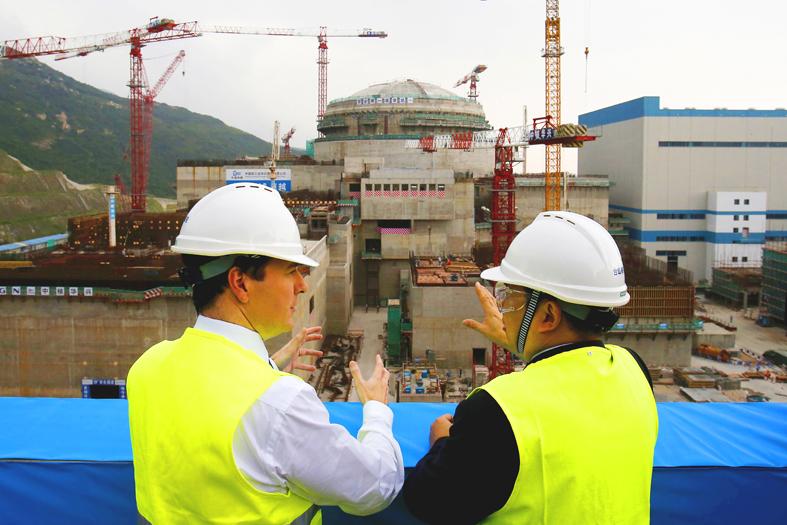The British government is exploring ways to remove China’s state-owned nuclear energy company, China General Nuclear Corp (CGN, 中國廣核集團), from all future power projects in the UK, in a further sign that relations between the countries are deteriorating.
Projects potentially at risk include the £20 billion (US$27.5 billion) Sizewell C nuclear power station in Suffolk and the proposed Bradwell-on-Sea development in neighboring Essex, a person familiar with the matter said on condition of anonymity.
CGN is also a 33 percent investor in the Hinkley Point C facility, which is under construction in Somerset and one of the biggest infrastructure projects in the country.

Photo: AP
The move underlines how British Prime Minister Boris Johnson’s administration is hardening its stance toward Beijing.
Johnson has blocked Huawei Technologies Co (華為) from participation in the rollout of Britain’s 5G wireless network and earlier this month, the British National Security Adviser opened a probe into the takeover of the country’s biggest chip plant by Chinese-owned Nexperia NV.
“All nuclear projects in the UK are conducted under robust and independent regulation to meet the UK’s rigorous legal, regulatory and national security requirements, ensuring our interests are protected,” a British Department for Business, Energy and Industrial Strategy spokesperson said in a statement, when asked about the stance. “Nuclear power has an important role to play in the UK’s low-carbon energy future, as we work towards our world-leading target to eliminate our contribution to climate change by 2050.”
News of the CGN plans was first reported by the Financial Times newspaper late on Sunday.
Chinese Ministry of Foreign Affairs spokesman Zhao Lijian (趙立堅) yesterday said: “The British should earnestly provide an open, fair and nondiscriminatory business environment for Chinese companies.”
China and Britain are important trade and investment partners for each other, he added.
“It is in the interests of both sides to conduct practical cooperation in the spirit of mutual benefit and a win-win result,” Zhao said.
Members of Johnson’s Conservative Party have repeatedly expressed concern about China’s increasing involvement in critical aspects of UK infrastructure and in its major educational establishments, such as Cambridge University.
Former party leader Iain Duncan Smith has said that Britain should use its post-Brexit status to put human rights at the heart of trade deals.
Nuclear power is set to play a key role in the government’s commitment to slash greenhouse gas emissions to net zero by 2050.
Although a major investment in offshore wind farms is set to help meet that goal, the country’s transmission network is to rely on nuclear as a backup — nuclear stations are designed to generate energy around the clock, whereas wind power is less predictable.
Additional reporting by Reuters

Intel Corp chief executive officer Lip-Bu Tan (陳立武) is expected to meet with Taiwanese suppliers next month in conjunction with the opening of the Computex Taipei trade show, supply chain sources said on Monday. The visit, the first for Tan to Taiwan since assuming his new post last month, would be aimed at enhancing Intel’s ties with suppliers in Taiwan as he attempts to help turn around the struggling US chipmaker, the sources said. Tan is to hold a banquet to celebrate Intel’s 40-year presence in Taiwan before Computex opens on May 20 and invite dozens of Taiwanese suppliers to exchange views

Application-specific integrated circuit designer Faraday Technology Corp (智原) yesterday said that although revenue this quarter would decline 30 percent from last quarter, it retained its full-year forecast of revenue growth of 100 percent. The company attributed the quarterly drop to a slowdown in customers’ production of chips using Faraday’s advanced packaging technology. The company is still confident about its revenue growth this year, given its strong “design-win” — or the projects it won to help customers design their chips, Faraday president Steve Wang (王國雍) told an online earnings conference. “The design-win this year is better than we expected. We believe we will win

Chizuko Kimura has become the first female sushi chef in the world to win a Michelin star, fulfilling a promise she made to her dying husband to continue his legacy. The 54-year-old Japanese chef regained the Michelin star her late husband, Shunei Kimura, won three years ago for their Sushi Shunei restaurant in Paris. For Shunei Kimura, the star was a dream come true. However, the joy was short-lived. He died from cancer just three months later in June 2022. He was 65. The following year, the restaurant in the heart of Montmartre lost its star rating. Chizuko Kimura insisted that the new star is still down

While China’s leaders use their economic and political might to fight US President Donald Trump’s trade war “to the end,” its army of social media soldiers are embarking on a more humorous campaign online. Trump’s tariff blitz has seen Washington and Beijing impose eye-watering duties on imports from the other, fanning a standoff between the economic superpowers that has sparked global recession fears and sent markets into a tailspin. Trump says his policy is a response to years of being “ripped off” by other countries and aims to bring manufacturing to the US, forcing companies to employ US workers. However, China’s online warriors